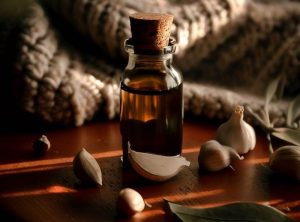Kannauj (pron: kən.nɔːd͡ʒ) is an ancient city in northern India with a history that spans more than 3000 years. Traditionally it has been an important centre for the production of attars. Attars are essential oils obtained by distilling plant parts such as flowers, wood and roots into sandalwood essential oil. Attar is a Persian word meaning "fragrance". The technique of making attars is thought to have been introduced by Muslim migrants from Persia and Afghanistan. Production continues to be traditional, with technology, tools and knowledge passed from generation to generation over hundreds of years. The production and sale of attars is still strongly linked to the Islamic heritage of the region. Since no alcohol is used in the production, Muslims are allowed to use it. Many attars are therefore exported to the different Gulf states.
Attar gulab is one of the most appreciated attars from Kannauj. It is made from rose petals. To produce one milliliter of extract (approximately 1 gram), four kilograms of rose petals are needed. These roses are grown in fields near the city of Kannauj, so that they can be used as fresh as possible and no valuable components are lost. During the first hours of the day, even before sunrise, farmers select petals of full-grown roses with an optimal content of volatile compounds.
Rose petals are bought by distillers such as Ali Brothers Perfumers and poured into copper stills. These huge boiler pots are called "dhegs". The stills are topped up with several buckets of well water and hermetically sealed with clay and a copper lid.
A fire is lit under the stills. Depending on the desired end product, dried cow manure and wood can be used as fuel. The fire burns all day, while the master distiller constantly checks the temperature. If the boiler gets too hot, it needs to be cooled. Steam generated in the kettle extracts the volatile components from the rose petals and is led through a bamboo pipe to a copper receiving kettle. The latter contains sandalwood oil and is cooled in a water bath. Steam condenses in the receiving kettle, while the volatile, fat-soluble components are being absorbed by the sandalwood oil. After the oil is drained and matured in leather bottles it is sold as attar. The rest of the condensed steam is called hydrosol and it also contains many fragrant ingredients from the rose petals. The hydrosol is the well-known "rose water."
Ali Brothers Perfumers makes other attars as well. For example, Ruh Kush attar is made from the roots of wild vetiver grass, Genda attar from the orange marigolds used in countless Hindu rituals, and Mehandi attar from the flowers of the henna bush. Some raw materials cannot be supplied fresh in Kannauj. For this reason complete distillation plants are occasionally hoisted on trucks and transported to remote areas in Northeast India, where, for example, Oudh (Agarwood) oil is made.
In Kannauj, even the scent of summer rain is extracted. Attar mitti is made from unbaked clay tablets from the banks of the nearby Ganges river, and smells like the first monsoon drops that drench the earth after a scorching hot and dry summer. Australian researchers, Isabel Joy Bear and Briton Roderick G. Thomas coined this scent "petrichor" in 1964. The organic compound that causes this odor is called geosmin.
Not everything in Kannauj is coming up roses. As in many industries in India, working conditions in attar production are harsh. A lot of smoke is released when firing the stills, which workers breathe unprotected. The production of flowers requires a lot of groundwater and some raw materials such as agar and sandalwood are scarce and endangered. In addition, although it rarely occurs, there is a risk that the pressure in the copper becomes too high. If a dheg explodes, consequences are catastrophic.
Attar has traditionally been used in chewing tobacco which is very popular in India. Due to increasing awareness about the health risks of that stimulant, this market is getting smaller. At the same time, there is an increasing demand for high-quality essential oils from Europe and North and South America, while non-alcoholic perfumes remain very popular in the Middle East. Although many producers of traditional attars have stopped in recent years, producers who are committed to quality and actively looking for new markets can thrive today.








